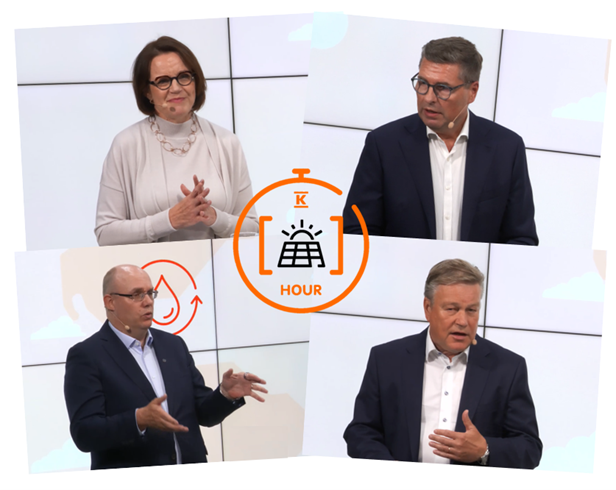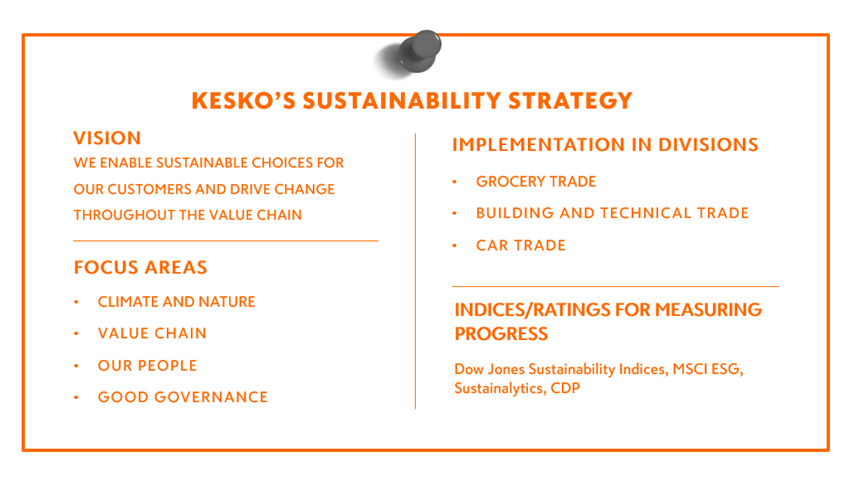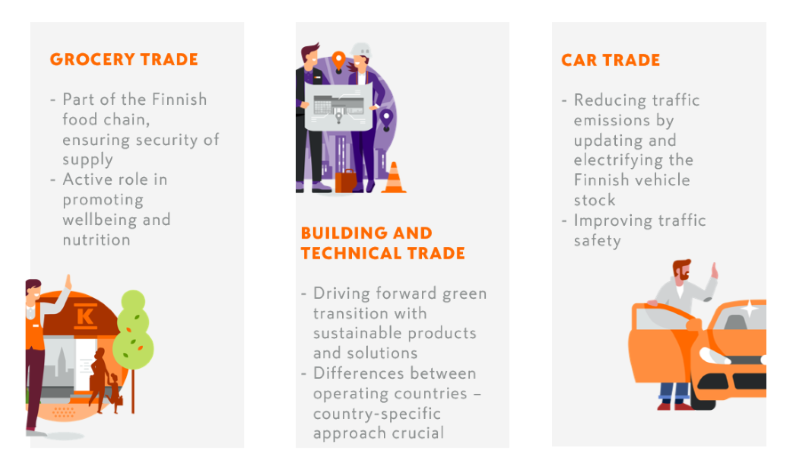

Investor blogs and podcasts
In Kesko’s investor blogs and podcasts, Kesko’s management discusses topical issues relevant to investors and shareholders.
IR Blog: #KeskoSustainabilityHour concluded that sustainability is good for business
Kesko updated its sustainability strategy earlier this year. On 29 August 2022, we hosted Kesko Sustainability Hour, a sustainability-themed virtual investor event where Kesko’s management shed light on how sustainability action impacts the Group’s operations, and how it can also translate into cost-savings and business opportunities.

Kesko Sustainability Hour included presentations by Riikka Joukio, EVP, Sustainability and Public Affairs; Jorma Rauhala, President of the building and technical trade division; Ari Akseli, President of the grocery trade division; and Matti Virtanen, President of the car trade division
Kesko has engaged in sustainability work for decades. The updated sustainability strategy adopted in March 2022 placed stronger focus on climate and nature, value chains, people, and good governance as the four central strategic themes. Riikka Joukio, EVP, Sustainability and Public Affairs, noted that the updated strategy also shifted the focus of sustainability work more firmly to everyday business operations and the business divisions, and introduced tangible targets and metrics for sustainability work.
Driving change throughout the value chain
Riikka Joukio stressed the importance of collaboration and engaging other parts of the value chain – including suppliers and consumers – in sustainability work. For example, when it comes to emissions, the biggest impacts in Kesko’s value chain are caused by the production and use of the products it sells. For example, the emissions from Kesko’s own operations (94,000 tCO2e) pale in comparison to emissions from the production of products sold (5,600,000 tCO2e) and emissions from the use and end-of-life treatment of the products (1,900,000 tCO2e). This is why it is important for Kesko to, for example, encourage its suppliers to report and reduce their emissions.
Sustainability does not necessarily lead to higher costs – it can actually help save money and create new business opportunities
Some people may have the impression that sustainability work inevitably leads to higher costs for the company. Riikka Joukio refuted the claim and noted that in fact bigger focus on sustainability can in fact be good for business, as it can help mitigate various risks, save costs, increase labour productivity, and create new business opportunities.
"Sustainability can be good for business and help mitigate various risks, save costs, increase labour productivity, and create new business opportunities"
Riikka Joukio, EVP, Sustainability and Public Affairs
In his presentation Ari Akseli, the President of Kesko’s grocery trade, offered some tangible examples of sustainability-related cost savings in his division: reducing the amount of food waste in grocery stores can save millions of euros, recyclable packaging can reduce recycling fees by up to 75%, and optimising transports reduces both emissions and logistics costs. Measures taken to improve energy efficiency in grocery trade operations become increasingly important as energy prices rise.
Meanwhile, Jorma Rauhala, President of the building and technical trade division, noted that the ongoing green transition is boosting the sales of products related to solar power, EV charging, different types of heat pumps and infrastructure products as well as of products related to their installation and use. Consumers are also eager to save energy, which is growing the sales of insulation products and energy-saving lighting solutions, for example. According to Rauhala, the total impact of the green transition on the division is difficult to quantify, as so many aspects of construction and renovation these days involve related elements.
In car trade, division President Matti Virtanen pointed out that the market for electric cars and other lower-emission vehicles is growing at a pace even the car industry could not have anticipated just a few years ago. Kesko represents the best-selling brand of electric cars in the country, and electric cars already account for 30% of our new car sales. K Group also offers EV charging, with a nationwide network set to double in size by the end of the year.
Different sustainability focus and actions for each of the three business divisions
Sustainability is a very wide ranging concept that entails a multitude of complex areas, stressed Riikka Joukio. Moreover, the emphasis of sustainability work differs between Kesko’s three business divisions.
The grocery trade division is an important part of the Finnish food chain and plays a vital role in ensuring security of supply for food. The division can also help promote healthier lifestyles in terms of nutrition.
As noted, the building and technical trade division plays an important role in driving forward the green transition. The division operates in 7 countries, and the main emphasis of sustainability work varies depending on the country.
In the car trade division, the focus is especially on updating the vehicle stock in Finland, which is one of the oldest in Europe, and consequently on helping reduce traffic emissions and improve traffic safety.
All in all, the event participants concluded that Kesko engages in sustainability action on a wide scale, and hoped that going forward, we would be able to communicate those actions and involve our partners and customers in them to an even larger extent.